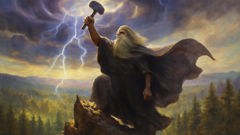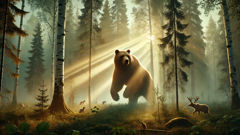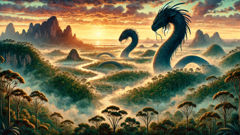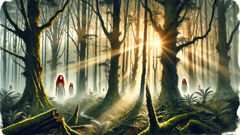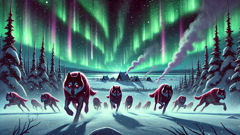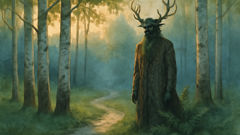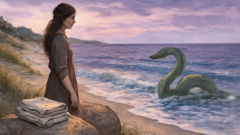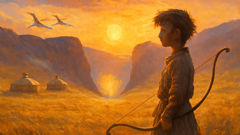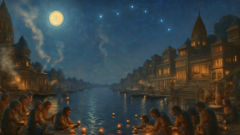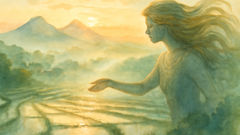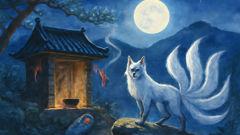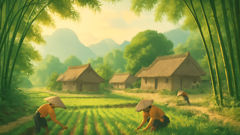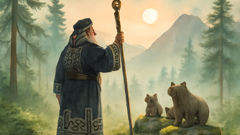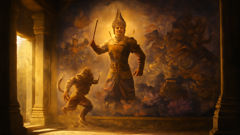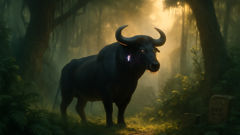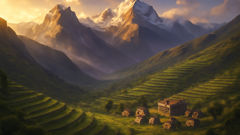Introduction
In the far reaches of the northern world, where the forests rise dense and the lakes glimmer beneath endless skies, Finland’s ancient people looked to the heavens with a mixture of awe and reverence. They lived at the mercy of fickle weather and the bounty—or scarcity—that it brought. To them, every roll of thunder, every flash of lightning, and every gentle patter of rain held meaning, a message from the gods who watched above the clouds. Among these mighty beings stood Ukko, revered as the greatest of all—the Thunder God, lord of the skies, keeper of the weather, and granter of harvests. His name was spoken in solemn tones around the fire and sung in the runes that would become the foundation of the Kalevala. Ukko’s presence was felt in the hum of the air before a summer storm, in the shimmering aurora that danced across the winter night, and in the trembling earth when his hammer struck the sky. People believed that their fates, their fields, and their very lives were bound to his moods and wisdom. Through the mists of time, Ukko’s myth was woven into every stone, river, and birch tree—a tale not only of a god’s might, but of nature’s eternal power and the fragile balance that holds the world together.
The Awakening of Ukko
Long before men had settled the broad Finnish lakes and forests, before the runes were first whispered, Ukko lay dormant within the heart of the sky. He was born from the ancient union of earth and firmament, his essence woven from the first bolt of lightning that split the primordial darkness. When Ukko awoke, he gazed down upon a world wild and untamed, where rivers ran in chaos and the sun’s warmth often failed to reach the forest floor. He saw a land yearning for order, a people in need of hope, and a sky longing for purpose. The gods of Finland’s early pantheon—Tapio of the forests, Ahti of the waters, and Louhi of the north—watched as Ukko claimed his place above them, his presence radiating with the thunder’s might. Yet Ukko was not a tyrant. He observed the world with deep wisdom, sensing that true power lay not in destruction but in harmony. When his mighty hammer, Ukonvasara, cracked the heavens, it was not merely to frighten or punish but to call forth the rain that nourished seeds and filled rivers. In every storm, Ukko carried the promise of life and the warning of nature’s untamable force.
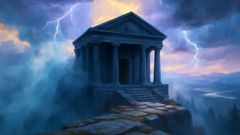
On the highest summit of Mount Koli, shrouded in clouds and veiled from mortal eyes, Ukko fashioned his dwelling. It was a hall built of blue granite and veined with silver, where the walls seemed to hum with the memory of every storm that had ever passed. From this perch, Ukko surveyed the tapestry of Finland: birch forests stretching endlessly, lakes catching the fleeting sun, and fields awaiting the touch of rain. His voice echoed with the wind, and when he sang, the sky shimmered with auroras. At his side was Rauni, goddess of fertility and the earth, whose gentle influence tempered Ukko’s tempestuous moods. Together, their union became a symbol of balance—sky and soil, thunder and harvest, storm and blossom.
Yet Ukko’s power was not unchallenged. Louhi, Mistress of the North and queen of the Pohjola, envied the dominion Ukko held over the skies. Her heart was cold as the northern ice fields, and she sought to wrest control of the weather, hoping to bring unending winter to the southern lands. She conjured spells of snow and darkness, sending biting winds to lash the forests and freeze the lakes. The people of Finland, desperate for warmth and the promise of spring, gathered around their fires and sang songs to Ukko, pleading for his mercy. Their voices rose like smoke, threading through the clouds to his mountain hall. Feeling their need, Ukko roused himself, gripping his hammer and calling forth the storm. Lightning arced across the sky, thunder boomed from horizon to horizon, and the power struggle between Ukko and Louhi began—a clash not only of gods but of seasons and survival.
In this cosmic battle, Ukko’s compassion for mortals shone brightest. He listened to their songs, answered their prayers with rain when drought threatened, and held back his wrath when their fields were already soaked. The people honored him with sacrifices of grain, honey, and mead, pouring libations upon sacred stones and raising their arms to the sky. Each offering was a token of gratitude and hope—a wish for a good harvest, for clear skies at midsummer, for protection from hail and fire. Through these rituals, Ukko became more than a distant deity; he was a constant presence in daily life, a guardian who watched over every plough and hearth.
Ukko’s Test: The Summer Without Rain
One year, as the birch leaves turned green and wildflowers bloomed along the meadows, Finland faced a summer like no other. The rains that usually fell with the blessing of Ukko were nowhere to be found. Day after day, the sun scorched the earth, and rivers shrank to trickles. Farmers gazed anxiously at their fields, watching as tender shoots wilted and the soil hardened to dust. Village elders whispered that Louhi’s spells had grown stronger, that perhaps even Ukko’s power was being tested. Children joined their mothers and fathers in song, their voices trembling with both hope and fear as they pleaded for rain. High on Mount Koli, Ukko listened. He felt the dryness seep into the earth, the prayers rising from every valley. Yet he hesitated. For the first time, the bond between sky and soil seemed strained. His hammer weighed heavy in his hand. Was it possible that Louhi’s sorcery could unbalance the harmony he had worked so long to preserve?
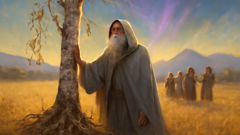
Ukko called forth his council. Rauni spoke gently, reminding him that even gods must sometimes yield and adapt. Tapio suggested seeking the wisdom of the oldest birch tree, whose roots drank deep from memory and earth. Reluctantly, Ukko descended in the form of a wandering old man, his cloak blending with the mist as he journeyed through the silent forests and parched fields. The people he met did not recognize him, yet their kindness touched him—a cup of cold water offered by a child, a weary farmer sharing his last piece of bread. At the edge of a dying meadow stood the ancient birch, its bark pale and leaves withered. Ukko placed his hand upon it and listened.
The tree spoke with a voice older than thunder. “Balance has shifted,” it whispered. “The sky grows proud, forgetting its pact with the soil. Thunder must humble itself and remember that rain is not a gift, but a duty.” Ukko’s heart trembled at these words. He realized his own pride had blinded him; he had become distant, his storms too fierce or too rare. Returning to Mount Koli, Ukko stood before his hall as dark clouds gathered for the first time in weeks. He lifted his hammer—not to punish, but to ask forgiveness. With a voice that shook mountain and valley, he promised to restore harmony. Lightning laced the sky, but this time its fire was gentle. Rain began to fall—slowly at first, then in a torrent that soaked the earth and filled the rivers anew. The people danced in the fields, singing songs of thanks as their crops sprang back to life. Even Louhi, seeing the humility and wisdom in Ukko’s heart, retreated to her northern domain, her envy softened by respect.
From that year on, Ukko’s storms became more measured. He watched closely for signs of drought or flood, listening to the songs and offerings from below. The people, in turn, honored him not with fear but with gratitude. At midsummer, bonfires blazed on every hilltop, their flames reaching for the sky as a sign of unity between heaven and earth. Ukko was no longer just the bringer of thunder; he became the god of renewal, a symbol of nature’s enduring balance. His legend grew, passed from father to son and mother to daughter, woven into the very fabric of Finnish life.
The Harvest Festival and Ukko’s Blessing
As summer faded to autumn and golden fields stretched beneath crisp blue skies, Finland’s people prepared for the harvest festival—Kekri, the time of thanksgiving and remembrance. It was a celebration deeply tied to Ukko’s favor, for every grain reaped and every apple picked was seen as a gift from his hand. Villagers decorated their homes with garlands of birch leaves and sheaves of rye. Tables groaned under the weight of bread, berries, fish, and honeyed mead. The air was thick with laughter and music as children raced through fields and elders recounted tales of gods and heroes by firelight.
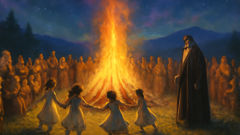
Central to the festivities was the great bonfire, built on the highest hill outside each village. At dusk, as shadows stretched across the land, families gathered in a circle, their faces illuminated by the flickering flames. The shaman, draped in robes adorned with feathers and silver bells, led the people in song—a hymn to Ukko, sung in ancient cadence. Their voices rose and mingled with the crackling fire, carried upward by the night breeze. It was believed that on this night, Ukko walked unseen among his people, judging their gratitude and humility.
In one village near Lake Saimaa, a young girl named Leena stood at the edge of the circle, her heart brimming with hope and wonder. Her family’s harvest had been modest, and her father ailed from a long illness. Still, Leena had gathered wildflowers and woven them into a crown as her offering to Ukko. As midnight approached and the festival’s songs grew softer, a sudden gust of wind stirred the flames and scattered embers into the starry sky. The villagers fell silent as a tall figure appeared beyond the fire’s glow—an old man with silver hair and a gaze that held the wisdom of countless seasons.
He spoke in a voice both gentle and powerful. “You have honored the balance. Let not fear nor pride guide you, but gratitude and care for one another.” With those words, he placed his hand upon Leena’s head and smiled. The next morning, dew sparkled across the fields, and a gentle rain fell—soft as a blessing. Leena’s father found new strength, and their crops flourished through the coming season. The village rejoiced, convinced that Ukko himself had visited their celebration. The legend of Leena’s kindness and Ukko’s blessing became a cherished story told at every Kekri for generations.
Over time, Ukko’s image softened in the hearts of the people. He was seen not only as a wielder of storms but as a guardian who cherished the humble joys of mortal life: the laughter of children, the sharing of bread, the warmth of a family fire. The rituals endured—offerings of mead poured on sacred stones, songs sung to the sky at midsummer and midwinter, dances performed in circles that echoed the whirling storms above. In every act of gratitude and remembrance, Finland’s people felt Ukko’s presence—sometimes fierce, sometimes gentle, always watching from his mountain hall above the clouds.
Conclusion
Ukko’s legend endures wherever thunder rumbles across the northern sky or rain brings life to the waiting fields. In the hearts of Finland’s people, he is more than a figure from ancient song—he is the living spirit of weather and balance, of strength tempered by compassion. His story reminds us that power is not measured in force alone but in the wisdom to listen, adapt, and care for all that grows beneath the heavens. The myth of Ukko is woven into every stormy night and sunlit morning, a timeless bond between land and sky. Even today, as modern life pulses through Finland’s forests and cities, echoes of Ukko’s hammer can still be heard—in every distant thunderclap and in every act of gratitude for the earth’s gifts. Thus, his tale is not just a memory but a living tradition, calling us to honor the fragile harmony that sustains us all.

